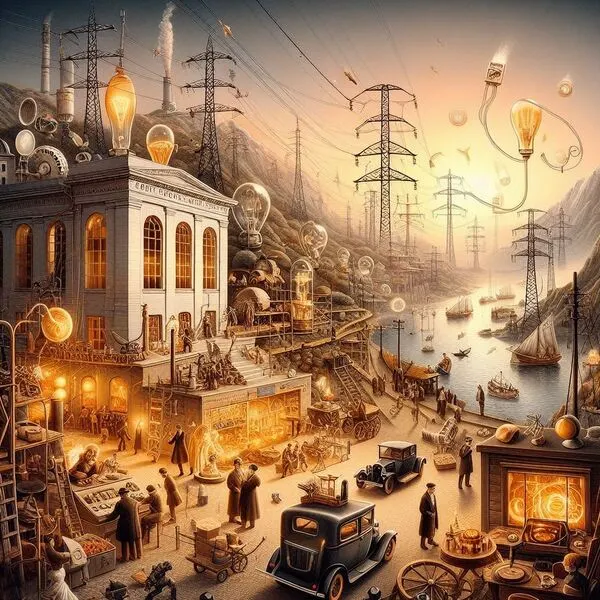The Shocking Journey: Unveiling the History of Electricity
Introduction
what is the Definition of electricity?
Electricity, a fundamental force of nature, is the flow of electric charge. It powers our modern world, driving technological advancements and shaping the way we live.
what is the Importance of electricity?
The significance of electricity cannot be overstated. It is the lifeblood of our society, fueling industries, revolutionizing transportation, and transforming communication.
what are the Ancient observations of electricity?
Even in ancient times, there were subtle hints of electricity. The Greeks, notably Thales of Miletus, observed static electricity, laying the foundation for future discoveries.
what are the Early Observations and Discoveries?
Thales of Miletus and static electricity
Thales of Miletus, a pre-Socratic Greek philosopher and one of the Seven Sages of ancient Greece, is often credited with laying the groundwork for the understanding of static electricity. Living around 624–546 BCE, Thales made pioneering observations that hinted at the mysterious forces of nature, setting the stage for future investigations into the fascinating realm of electricity.
Discovery and observations
Thales’ experiments with amber revealed its ability to attract lightweight objects, marking an early understanding of static electricity.
Significance
Thales’ observations set the stage for future investigations into the nature of electricity, sparking curiosity among scientists.
William Gilbert and the term “electricity”
In the rich tapestry of the history of electricity, William Gilbert, an English physician and natural philosopher of the late 16th century, stands as a pivotal figure. Gilbert’s contributions extended beyond mere observation; he played a key role in unifying diverse phenomena related to electricity and, notably, in coining the term “electricity.”
Coining of the term
In the 17th century, William Gilbert coined the term “electricity,” unifying diverse phenomena like amber’s static charge and magnetic forces.
Impact on understanding of electricity
Gilbert’s terminology provided a common language for scientists, fostering a more systematic approach to the study of electricity.
1700s: Experiments and inventions
The 18th century witnessed remarkable strides in understanding electricity.
Stephen Gray and electrical conduction
Gray’s experiments distinguished conductors from insulators, laying the groundwork for the development of electrical circuits.
Ewald Georg von Kleist and the Leyden jar
Kleist’s invention of the Leyden jar, a device for storing static electricity, opened new possibilities for experimentation.
Significance of these advancements
These breakthroughs paved the way for practical applications, foreshadowing the transformative impact of electricity on society.

The Rise of Electricity Generation and Transmission
Alessandro Volta and the voltaic pile
Alessandro Volta, an Italian physicist, is celebrated for his groundbreaking work in the field of electricity during the late 18th and early 19th centuries. His most notable achievement, the invention of the voltaic pile, marked a revolutionary leap in the generation of electric power and laid the foundation for modern battery technology.
Invention of the first battery
Volta’s creation of the voltaic pile in 1800 marked a turning point, providing a reliable source of continuous electric current.
Impact on the development of electricity
Volta’s battery spurred innovations in electric circuits and facilitated the exploration of electromagnetism.
Michael Faraday and the electric motor
In the pantheon of electrical pioneers, Michael Faraday, a British scientist of the 19th century, shines as a luminary whose experiments with electromagnetism reshaped the landscape of electrical engineering. Among his many contributions, Faraday’s work on the electric motor stands as a monumental achievement, forever altering the course of technological progress.
Discovery of electromagnetic induction
Faraday’s groundbreaking work on electromagnetic induction laid the foundation for electric motors and generators.
Applications of the electric motor
Faraday’s discoveries revolutionized industries, Dryer Motor, inverter motor powering machinery and setting the stage for the electrification of society.
Thomas Edison and the incandescent light bulb
In the annals of technological history, Thomas Edison’s name is synonymous with innovation, and his most enduring legacy, the incandescent light bulb, forever altered the course of human civilization. Edison’s relentless pursuit of a practical and commercially viable electric light source paved the way for a transformative era in illumination.
Development of the practical light bulb
Edison’s persistence led to the creation of a commercially viable incandescent light bulb, transforming the way we illuminate our world.
Transformation of lighting technology
Edison’s invention rapidly replaced gas lamps, ushering in a new era of safer and more efficient lighting.
Nikola Tesla and George Westinghouse and the AC system
The late 19th century witnessed a fierce battle of ideas in the realm of electrical power distribution, with Nikola Tesla and George Westinghouse collaborating to champion alternating current (AC). Their efforts heralded a new era in electricity transmission, bringing about advancements that would shape the modern power grids we rely on today.
Development of the alternating current system
Tesla and Westinghouse’s collaboration brought us alternating current (AC), a more efficient method of electricity transmission.
what are the Advantages of AC over DC?
The AC system proved superior for long-distance power transmission, contributing to the expansion of electrical grids.
what is the Impact Of Electricity on transmission?
The AC system laid the groundwork for the interconnected grids that power our homes and industries today.

what is The Impact of Electricity on Society?
We will be exploring the impact of electricity on society, and its role in revolutionizing industries, redefining transportation, facilitating communication, transforming home life, revolutionizing medicine, and ultimately influencing the very fabric of our daily existence. As we traverse the historical milestones and societal transformations spurred by the advent of electricity, we gain a deeper understanding of its pivotal role in the past, present, and the potential it holds for shaping our future.
what is The Impact of Electricity on industry?
Electricity’s impact on industry has been nothing short of revolutionary, ushering in an era of unprecedented growth, efficiency, and innovation. The widespread adoption of electric power in industrial processes has transformed the manufacturing landscape and significantly enhanced productivity. One of the pivotal moments in this evolution was the electrification of factories, a paradigm shift that replaced traditional mechanical power with electrical energy. This transition not only streamlined production processes but also laid the foundation for automation, marking a crucial turning point in the history of industry.
Increased productivity and automation
Electricity revolutionized industries, boosting efficiency and enabling mass production.
Examples of industrial applications
Industries like manufacturing and assembly line production witnessed unprecedented growth due to the adoption of electric power.
what is The Impact of Electricity on transportation?
Electricity has ignited a transformative revolution in the realm of transportation, reshaping the way we move people and goods. The electrification of transportation, driven by advancements in battery technology and electric drivetrains, has brought about significant environmental benefits and technological advancements.
Development of electric vehicles
The electric motor found its way into transportation, with the development of electric vehicles, reducing reliance on traditional fossil fuels.
Influence on transportation infrastructure
Charging stations and electric vehicle infrastructure reshaped cities, offering sustainable and clean alternatives for commuters.
what is The Impact of Electricity on communication?
The integration of electricity into the realm of transportation has been a transformative force, reshaping the way we move people and goods. From the earliest electric vehicles to the sophisticated infrastructure supporting them, electricity has played a pivotal role in reducing environmental impact and revolutionizing the efficiency of transportation systems.
Development of communication technologies
Electricity propelled the evolution of communication, from telephones and telegraphs to the introduction of radio and television.
Impact on communication efficiency and accessibility
The speed and reach of communication improved dramatically, connecting people across vast distances.
what is The Impact of Electricity on home life?
Electricity’s integration into households has revolutionized the way people live, offering convenience, comfort, and efficiency that were unimaginable in the pre-electrification era. From lighting and heating to a plethora of electric appliances, the electrification of homes has significantly improved the quality of life for individuals and families.
Introduction of electric appliances
Electricity transformed homes, bringing forth a plethora of electric appliances such as electric dryer that simplified daily tasks.
Transformation of lighting and heating
Electric lighting and heating systems replaced traditional methods, enhancing comfort and convenience.
Improvement of quality of life
The integration of electricity into homes elevated the standard of living, making life more comfortable and enjoyable.
what is The Impact of Electricity on medicine?
The introduction of electricity into the field of medicine has been a groundbreaking and transformative development, revolutionizing diagnostics, treatments, and overall patient care. From the pioneering use of electric shocks in the 18th century to the sophisticated medical devices of the present day, electricity has played a pivotal role in advancing healthcare.
Development of X-ray
X-ray technology Electricity revolutionized medical diagnostics with the development of X-ray technology, allowing doctors to see inside the human body without invasive procedures.
Introduction of life-saving medical devices
The advent of electrically powered medical devices, such as pacemakers and defibrillators, significantly improved patient outcomes.
Advancement of medical treatments
Electricity played a crucial role in medical advancements, contributing to therapies like electroconvulsive therapy (ECT) and powering equipment in surgical procedures.

what is The Future of Electricity?
The future of electricity promises a landscape marked by sustainability, efficiency, and unprecedented advancements. In this exploration of what lies ahead, we delve into key areas that will shape the trajectory of electricity, from harnessing renewable sources to revolutionizing energy storage and embracing smart grid technologies. The evolution of electricity is not just a scientific and engineering feat; it’s a crucial element in shaping a sustainable and interconnected future for generations to come.
1. Renewable energy sources
Solar, wind, and other renewable technologies
The future of electricity lies in harnessing renewable sources like solar and wind power, addressing concerns about environmental sustainability.
Sustainability and environmental concerns
As society shifts towards renewable energy, the focus on sustainability becomes paramount, mitigating the environmental impact of energy production.
2. Energy storage
Development of batteries and other storage solutions
Advancements in energy storage, including battery technologies, are crucial for storing intermittent renewable energy and ensuring a stable power supply.
Importance of energy storage for renewable energy integration
Efficient energy storage systems are essential for balancing the intermittent nature of renewable sources, providing a reliable and consistent power output.
3. Smart grids
Intelligent systems for managing electricity demand and supply
Smart grids, equipped with advanced monitoring and control technologies, optimize the distribution of electricity, reducing waste and enhancing efficiency.
Optimization of energy consumption
Smart grids enable consumers to monitor and adjust their energy usage, promoting a more conscious and efficient approach to electricity consumption.
4. Electric vehicles
Transition from gasoline-powered to electric vehicles
The future of transportation lies in electric vehicles, offering a cleaner and more sustainable alternative to traditional combustion engine vehicles.
Environmental benefits of electric transportation
The widespread adoption of electric vehicles contributes to reducing air pollution and dependence on fossil fuels, promoting a greener and healthier environment.
Conclusion
Recap of key points about the history of electricity
The journey of electricity from ancient observations to the present day has been a story of innovation, discovery, and transformation.
Emphasis on the importance of electricity in the past, present, and future
Electricity has been a driving force behind societal progress, and its continued evolution is crucial for a sustainable and technologically advanced future.
Potential implications of future developments in electricity
As we look ahead, advancements in electricity hold the promise of a cleaner, more efficient, and interconnected world, shaping the way we live, work, and communicate.







